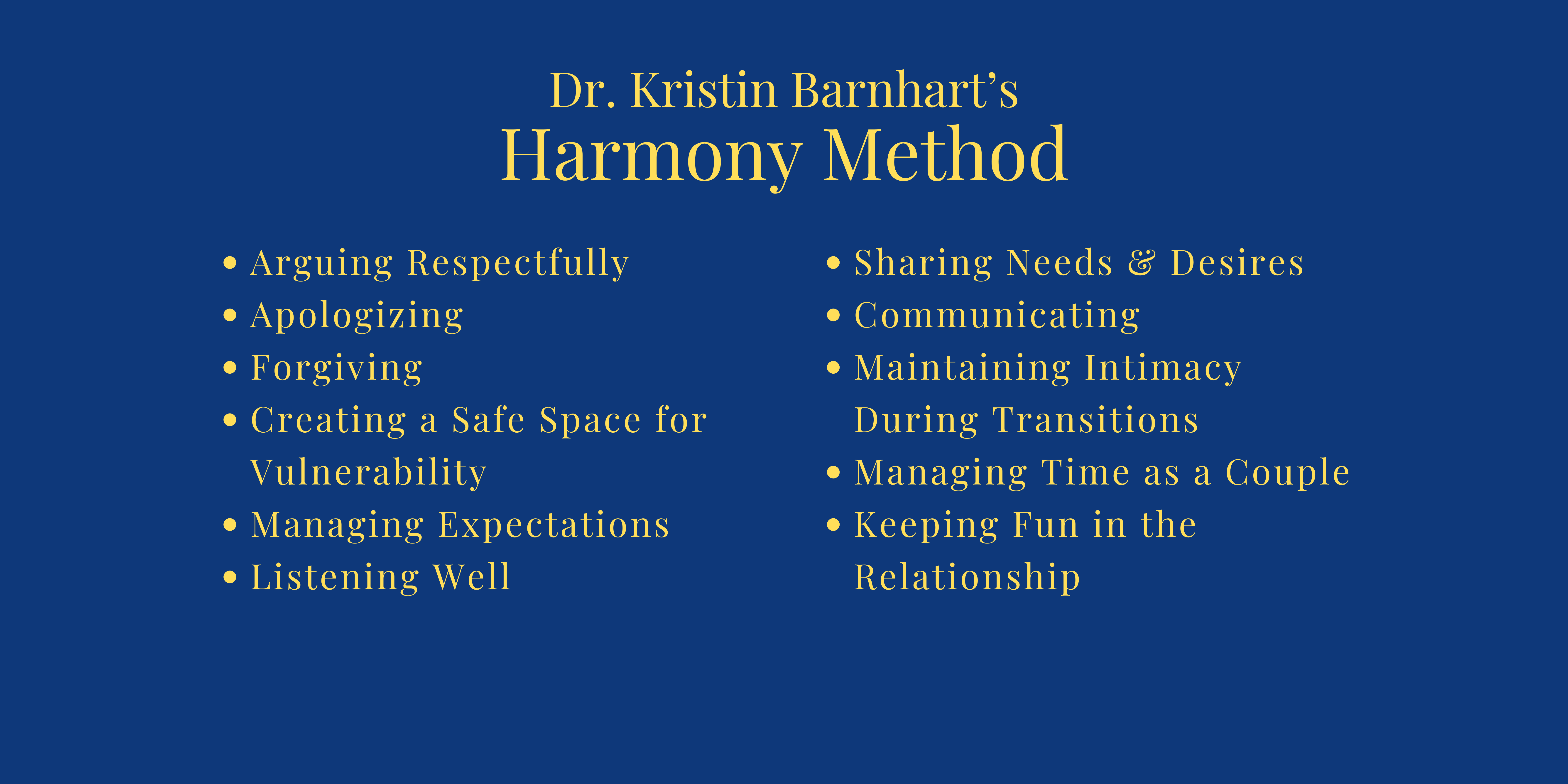Do you ever catch yourself glaring at the socks on the floor or the pile of dishes in the sink, wondering how you went from wedding bliss to barely speaking before coffee?
If you’re shocked that this kind of tension is showing up so soon after “I do,” I’m here to give you hope and tools.
Relevant Magazine’s article “Struggling as a newlywed? You’re not alone” title hits the nail on the head, and as a psychologist who works with newlyweds all the time, I want you to know this is completely normal.
These early adjustments aren’t red flags. They’re just signals. Signals that it’s time to keep investing in your relationship, especially your communication, so you can build a strong, healthy foundation for everything that comes next.
Read on, and you’ll walk away with some practical marriage communication tools, and at the end, there’s an open invitation to reach out if you’d like personalized support to address any underlying issues that the blog doesn’t cover (BTW: I’m now authorized to provide online couples therapy to clients from 42 states).
Why the First Year of Marriage Is So Important

Some days will feel magical, like finishing a puzzle you both built together. Other days, it feels like you threw away the box and have no idea what the final picture is supposed to look like.
Brides Magazine reminds us that “the stresses of wedding planning, adjusting to married life, and increased significance of conflicts contribute to the challenging first year.”
Some days will feel magical, like finishing a puzzle you both built together. Other days, it feels like you threw away the box and have no idea what the final picture is supposed to look like.
Brides Magazine reminds us that “the stresses of wedding planning, adjusting to married life, and increased significance of conflicts contribute to the challenging first year.”
You’ve probably scrolled past Instagram posts depicting everything perfect in a marriage, only to secretly wonder, “Am I supposed to be ok with my spouse leaving their dirty socks in the kitchen?”
The reality is that the honeymoon phase can fade faster than you want, and that’s perfectly normal.
The first year sets the framework for your emotional, financial, and relational foundation, so it’s worth catching small issues early before they turn into bigger ones.
According to Bonobology, “The first year of marriage teaches you that your partner may have a very different idea of cleaning than you do.” Most couples notice that the way they communicate changes a little after the wedding. Intimacy might feel different than what you hoped, and when it comes to money, you might suddenly realize you and your partner have very different ways of handling it…things that didn’t seem like a big deal while you were dating.
You’ve probably scrolled past Instagram posts depicting everything perfect in a marriage, only to secretly wonder, “Am I supposed to be ok with my spouse leaving their dirty socks in the kitchen?”
The reality is that the honeymoon phase can fade faster than you want, and that’s perfectly normal.
The first year sets the framework for your emotional, financial, and relational foundation, so it’s worth catching small issues early before they turn into bigger ones.
According to Bonobology, “The first year of marriage teaches you that your partner may have a very different idea of cleaning than you do.” Most couples notice that the way they communicate changes a little after the wedding. Intimacy might feel different than what you hoped, and when it comes to money, you might suddenly realize you and your partner have very different ways of handling it…things that didn’t seem like a big deal while you were dating.
Quick Takeaways Right Out of the Gate:
- Set (Realistic) Expectations: You might love each other to the moon and back, but the idea that your spouse will instinctively know how you like your coffee (non-dairy oat latte at precisely 150°F) or anticipate every emotional need is not realistic. “A big part of what to expect after marriage, in that first year, is the art of how to balance your expectations from the marriage.”
- Pay Attention to Communication Patterns: If you spend those first months passive-aggressively texting chores as if they’re life-or-death tasks, you’ll set a pattern of avoiding difficult conversations instead of having heart-to-heart talks.
- Be Intentional with Intimacy & Affection: Spoiler: cuddles don’t always lead to fireworks. They sometimes lead to snoring. Yet it’s in those tiny moments, hand squeezes, hallway kisses, “How was your day?” check-ins, where the real foundation of connection is built.
Quick Takeaways Right Out of the Gate:
- Set (Realistic) Expectations: You might love each other to the moon and back, but the idea that your spouse will instinctively know how you like your coffee (non-dairy oat latte at precisely 150°F) or anticipate every emotional need is not realistic. “A big part of what to expect after marriage, in that first year, is the art of how to balance your expectations from the marriage.”
- Pay Attention to Communication Patterns: If you spend those first months passive-aggressively texting chores as if they’re life-or-death tasks, you’ll set a pattern of avoiding difficult conversations instead of having heart-to-heart talks.
- Be Intentional with Intimacy & Affection: Spoiler: cuddles don’t always lead to fireworks. They sometimes lead to snoring. Yet it’s in those tiny moments, hand squeezes, hallway kisses, “How was your day?” check-ins, where the real foundation of connection is built.
Single to Married: What People Learn during Their First Year of Marriage

Let’s be honest—“What were your first few months of marriage like? How is it different now?” is the kind of question that shows up at every holiday party, bridal shower, or slightly-too-personal dinner with in-laws.
For many couples, that honeymoon glow fades faster than anticipated. You’re not suddenly immune to disagreements just because you’ve exchanged rings. The reality is that when two people move from “me” to “we,” you both bring whole résumés of habits, family dynamics, and communication styles that may not align.
So, here are some topics to address with curiosity and teamwork in your first year:
- Balancing Independence & Togetherness: Each of you is still an individual. You still want that evening run, that solo productivity sprint. But now you’re in a duo, and syncing up schedules can feel like co-authoring a book without a shared outline.
- Boundary-Setting (In-Laws & Exes): Suddenly, your spouse’s family is your family, and navigating grandparents who demand regular FaceTimes can feel like an unexpected inconvenience. And your spouse is still Facebook friends with their exes. That can get sticky quickly.
- Values & Faith: Whether it’s a prayer before bed, a monthly couples’ group at church, or mindful gratitude practices, carving out shared rhythms that align with what’s most important to you helps you two prepare for heavy things that come up in life.
Communication, Communication, Communication
If you thought the hardest adjustment to marriage would be sharing toothpaste, wait until you realize how tough it can be to agree on a monthly budget. During those uninvited newlywed advice sessions that people tend to impose, you may find yourselves swinging from blissful “We’re great!” moments to “Why does folding towels feel so tense in no time.


I designed The Harmony Method just for couples like you, and it’s not available anywhere else. This exclusive set of tools and strategies helps make communication feel easier and more natural, while strengthening your connection right from the start. No generic advice, just a method that meets you where you are and helps you grow closer together.
What You’ll Learn Inside The Harmony Method

- Guidelines for arguing respectfully
- How to apologize and forgive without glossing over the pain
- Ways to create a safe space for vulnerability
- Tools for managing expectations (spoken and unspoken)
- How to express needs and desires clearly
- How to stay emotionally connected through life’s transitions
- Time management tips that protect your marriage
- Creative ways to bring joy and fun back into your relationship
The Beginning of Marriage Can Be Tough, No Matter How You Spin It


Let’s be real: no matter how many pre-marital workshops you attend, “married life” can still smack you upside the head. Brides Magazine puts it bluntly: “The first year of marriage is notoriously difficult. The stresses of wedding planning, adjusting to married life, and the increased significance of conflicts contribute to the challenging first year.”
Top 5 Common Struggles in the First 6 Months of Marriage
- Work-Life Overwhelm: You both chase big careers. Sometimes you text each other, “Where are you?” instead of “I love you.” This is not how you imagined things would be. On top of that you’re feeling resentful about how the workload at home is divided
- Family Boundaries: Grandma thinks you should move in next door, FIL thinks you should start a family this year. Setting gentle but firm boundaries is key, but first the two of you need to get on the same page.
- Money Matters: Two bank accounts morph into one. Suddenly, a $50 clothing purchase feels like financial treason.
- Intimacy Disconnect: Late-night client calls and spreadsheets can kill the spark right of your date nights. Let’s get expectations aligned asap.
- Conflict Loops: Having the same argument on repeat without resolution and wondering, “Shouldn’t this be easier?”
Keep hopeful and don’t give up. These challenges are your proving ground and couples therapy is available if you’d like some help. When you learn to navigate them together, you’re sculpting a relationship that can weather bigger storms down the road. If conversations about these tricky topics turn bumpy, reach out. I’m here for you. There may be underlying issues to uncover and heal.
My #1 Marriage Advice After the First 6 Months

By month six, that initial sparkle can become dull and turn into “Why do I feel like I’m failing at something that’s supposed to be all love and roses?” Here’s my Marriage advice quote: I recommend that my clients memorize it, write it on a post-it, or create a new note on their phone:
“Ask your partner if they’d like to be helped, hugged, or heard.”
This isn’t just feel-good fluff. It’s a direct line to emotional intelligence. When you check in, saying something like “Do you want advice about what’s going to work, a hug because you’re stressed, or do you just want me to listen?” you stop the silent mind-reading game and you grow closer. According to Verywell Mind, this kind of clear-choice check-in prevents misfires that escalate into full-blown blowups.
Why it works:
- Offers Choice: Sometimes your spouse isn’t looking for your recommendation on conflict resolution. They just want your shoulder.
- Builds Safety: After you master the “Arguing Respectfully” module of my Harmony Method, you both know that disagreements are opportunities to grow closer.
- Reduces Resentment: When chores, money, or family drama trigger you, a simple “helped, hugged, or heard?” can turn a grudge into a collaborative brainstorm.
Next Steps
You don’t have to tackle this alone. If you’re nodding along to any of the above and thinking, “I need support,” here’s how to keep the momentum going:
1. Download this free guide: 10 Simple Shifts to Increase Fun & Intimacy
- Practical, bite-sized tips for adding laughter and closeness to your weekly routine.
- Download Now
2. Schedule a complimentary 15-minute consultation with me
- Let’s talk about where you’re stuck and craft a personalized plan for resetting so you have a firm foundation to build your marriage on for years to come.
- Book Your Call
3. Enroll in RECONNECT: A Self-Paced Online Course to Boost Communication Skills
- Learn practical tools you can use today for staying emotionally regulated during conflict, navigating misunderstandings, staying connected as a couple when visiting in-laws, and knowing when to listen or problem solve.
- Enroll Now
Just because you’re struggling as newlyweds doesn’t mean you’re failing. It means you’re learning something new together. With the right Marriage communication tools, a dose of Marriage advice humor, and some expert guidance, you can move from “Is this normal?” to “We’ve got this.” When you’re ready, I’m here to walk with you toward a more connected, resilient marriage.
P.S. If this hit home for you, tap the ❤️, drop a comment to share your story or thoughts, and let me know what you’d love to hear more about as a newlywed. Your voice helps shape this space, and you never know who might feel a little less alone because you spoke up.




0 Comments